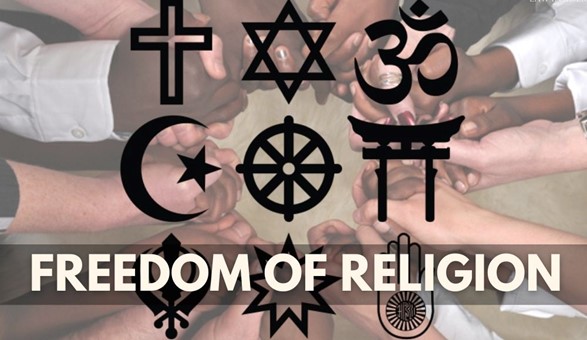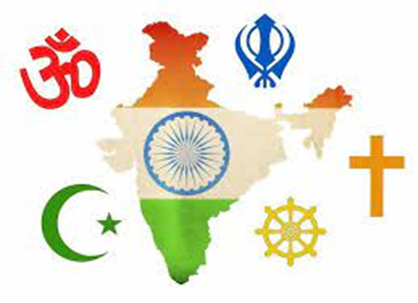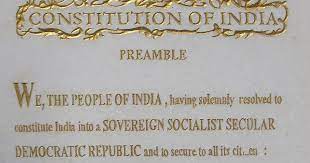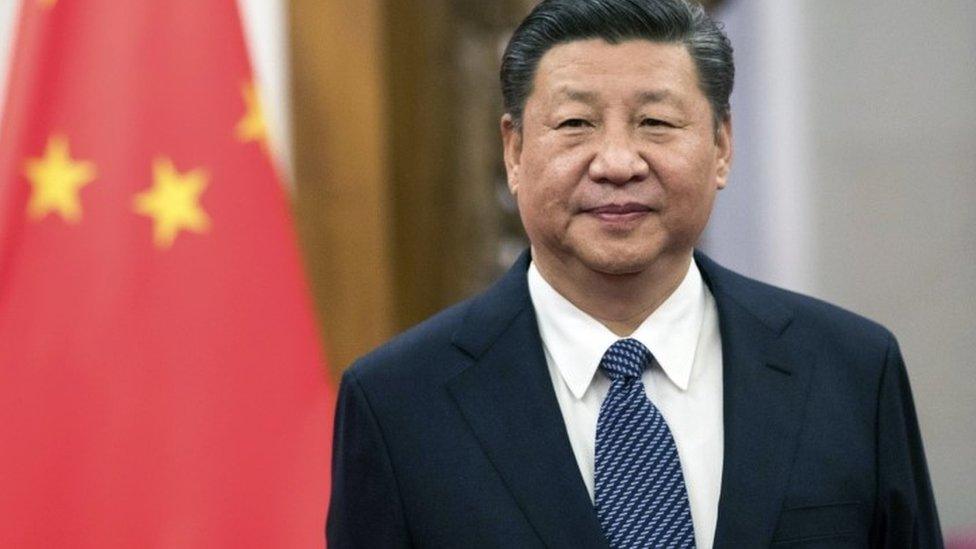- Courses
- GS Full Course 1 Year
- GS Full Course 2 Year
- GS Full Course 3 Year
- GS Full Course Till Selection
- Answer Alpha: Mains 2025 Mentorship
- MEP (Mains Enrichment Programme) Data, Facts
- Essay Target – 150+ Marks
- Online Program
- GS Recorded Course
- Polity
- Geography
- Economy
- Ancient, Medieval and Art & Culture AMAC
- Modern India, Post Independence & World History
- Environment
- Governance
- Science & Technology
- International Relations and Internal Security
- Disaster Management
- Ethics
- NCERT Current Affairs
- Indian Society and Social Issue
- NCERT- Science and Technology
- NCERT - Geography
- NCERT - Ancient History
- NCERT- World History
- NCERT Modern History
- CSAT
- 5 LAYERED ARJUNA Mentorship
- Public Administration Optional
- ABOUT US
- OUR TOPPERS
- TEST SERIES
- FREE STUDY MATERIAL
- VIDEOS
- CONTACT US
Freedom of Religion
Freedom of Religion


Latest Context
Recently, in reply to a petition in the Supreme Court, the Tamil Nadu (TN) Government stated that Article 25 (Freedom of Religion) of the Indian Constitution guarantees every citizen the right to propagate his religion. The complaint was filed by a petitioner about the instances of forceful conversion in TN that violates Fundamental Rights enshrined in the Indian Constitution.
Facts about the Case
-
Forceful Conversion: In the light of the forceful conversion of a 17-year-old girl to Christianity in Tamil Nadu that led to her death, the petitioner urged the Government to seek an NIA (National Investigation Agency)/CBI (Central Bureau of Investigation) investigation about the “root cause” of this incidence. In his petition, the petitioner advocated that forcible or deceitful conversion was a violation of fundamental rights.
-
Reply of Tamil Nadu Government: As per the Tamil Nadu Government, the acts of missionaries to spread Christianity by themselves cannot be seen as illegal because the Constitution of India guarantees every citizen the right to propagate his religion under Article 25. However, if their act of spreading their religion is against public order, morality, health, and against other provisions of Part III of the Constitution, it has to be taken seriously.
Concept of the Freedom of Religion
-
Concept: The constitution of India guarantees every citizen a right and liberty to preach, practice and propagate the religion of his choice. Additionally, this right also proffers an opportunity to spread it among everyone without any fear of government intervention. Moreover, it is expected by the state to practice it amicably within the jurisdiction of the country.
-
Need: One of the biggest characteristics of India is that it has unity with diversity. Currently, India is home to people of different religions who follow different faiths. According to the Pew Research Centre 2021, there are 4,641,403 people who follow other religions different from the six major religions Hinduism, Jainism, Islam, Buddhism, Sikhism, and Christianity. In the light of such a vast diversity, it becomes necessary to protect and secure the right of faith of each and every religion.
Secularism
-
Constitutional Provision: The word ‘Secular’ in the Indian Constitution was added by the 42nd Constitutional Amendment in 1976 to the preamble of the Constitution. India is a secular country. It means that there will be no religion of a state. It also connotes that the state will be neutral to every religion. In Ahmedabad St. Xavier’s College v. State of Gujarat (1975), the Supreme Court held that Secularism neither means neither pro-God nor anti-God. It ensures that the state will not make any difference on the basis of religion which eliminates the concept of God in matters of the state.
Constitutional Provisions Related to Freedom of Religion
-
Article 25: It guarantees the freedom of conscience, freedom of profession, practice and propagation of religion.
-
Article 26: It ensures the right to establish and maintain institutions for religious and charitable purposes. In addition, it also guarantees to manage its own affairs in the matter of religion, to move and acquire moveable and immovable property, and to administer such property in accordance with the law.
-
Article 27: It guarantees the freedom as to payment of taxes for the promotion of any particular religion.
-
Article 28: It gives freedom as to attendance at religious instruction or religious worship in certain educational institutions.
Secularism in India v/s US:
-
India follows the concept of ‘neutrality’ and ‘positive role’ towards religion. The State has the power to introduce religious reforms, protect minorities and formulate policies on religious matters.
-
While. the US follows the principle of ‘non-interference’ in matters of religion. The State cannot take any action in religious matters.
Major Judicial Pronouncements on Freedom of Religion
-
Bijoe Emmanuel and Ors. v. State of Kerala (1986): In this case, three children of the Jehovah’s Witnesses sect were suspended from the school. The reason is that they refused to sing the national anthem by citing the reason that it is against the tenets of their faith. The court was of the view that expulsion is violative of fundamental rights and the right to freedom of religion.
-
Acharya Jagdishwaranand v. Commissioner of Police, Calcutta (1983): The Court stated that Ananda Marga is not a separate religion. It is a religious denomination. The performance of Tandava on public streets is not an essential practice of Ananda Marga.
-
M. Ismail Faruqui v. Union of India (1994): The apex court held that the mosque is not an essential practice of Islam, and a Muslim can offer namaz (prayer) anywhere even in the open.
-
Raja Birakishore v. State of Orissa (1964.): The validity of the Jagannath Temple Act, 1954 was challenged because it enacted provisions to manage the affairs of Puri temple on the grounds that it is violating Article 26. The court was of the view that the Act regulated only the secular aspect of seva puja, therefore, it is not violative of Article 26.
Latest Developments
-
States like Gujarat, Himachal Pradesh, Jharkhand, Karnataka, Arunachal Pradesh, Chhattisgarh, Madhya Pradesh, Odisha, Uttar Pradesh, and Uttarakhand have passed laws restricting religious conversion.
-
In August 2022, Himachal Pradesh Freedom of Religion (Amendment) Bill 2022 was passed by Himachal Pradesh to criminalize mass religious conversions.
-
In March 2022, the Haryana Prevention of Unlawful Conversion of Religion Bill, 2022 was passed by Haryana State Assembly passed against religious conversion by allurement, coercion, or fraudulent means.



